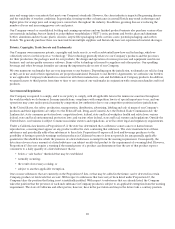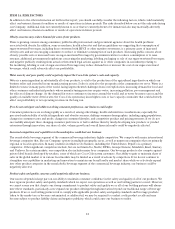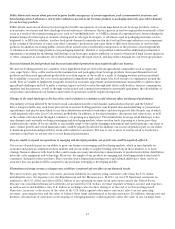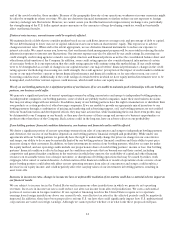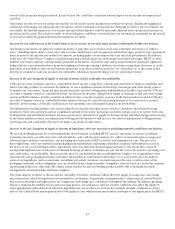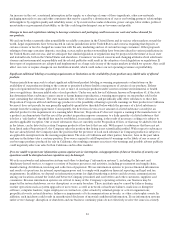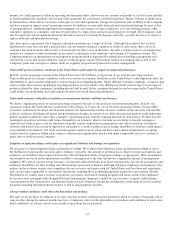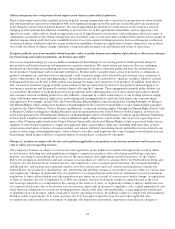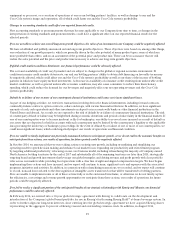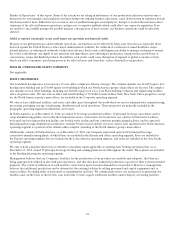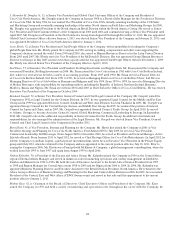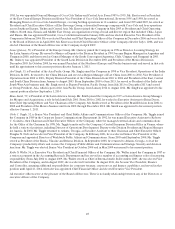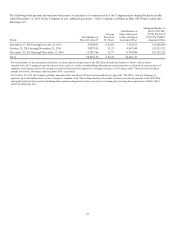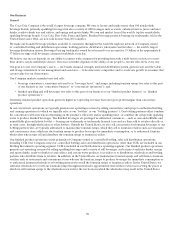Coca Cola 2014 Annual Report Download - page 22
Download and view the complete annual report
Please find page 22 of the 2014 Coca Cola annual report below. You can navigate through the pages in the report by either clicking on the pages listed below, or by using the keyword search tool below to find specific information within the annual report.20
we entered into definitive agreements with Monster for a long-term strategic relationship in the global energy drink category, and
upon the closing of the transactions contemplated by the agreements we will acquire newly issued shares representing approximately
16.7 percent of Monster’s issued and outstanding shares of common stock (after giving effect to the issuance). If we are unable to
successfully manage our complex relationships with Keurig and Monster; if the introduction of Keurig’s Keurig Kold™ beverage
system is delayed or, when introduced, the Keurig Kold™ beverage system does not perform as expected; or if for any other reason
we fail to realize all or a significant part of the benefits we expect from one or both of these strategic relationships and the related
investments, our financial performance could be adversely affected.
If we are unable to renew collective bargaining agreements on satisfactory terms, or we or our bottling partners experience strikes, work
stoppages or labor unrest, our business could suffer.
Many of our associates at our key manufacturing locations and bottling plants are covered by collective bargaining agreements.
While we generally have been able to renegotiate collective bargaining agreements on satisfactory terms when they expire and regard
our relations with associates and their representatives as generally satisfactory, negotiations in the current environment remain
challenging, as the Company must have competitive cost structures in each market while meeting the compensation and benefits needs
of our associates. If we are unable to renew collective bargaining agreements on satisfactory terms, our labor costs could increase,
which could affect our profit margins. In addition, many of our bottling partners’ employees are represented by labor unions. Strikes,
work stoppages or other forms of labor unrest at any of our major manufacturing facilities or at our or our major bottlers’ plants could
impair our ability to supply concentrates and syrups to our bottling partners or our bottlers’ ability to supply finished beverages to
customers, which could reduce our net operating revenues and could expose us to customer claims.
We may be required to recognize impairment charges that could materially affect our financial results.
We assess our goodwill, trademarks and other intangible assets as well as our other long-lived assets as and when required by
accounting principles generally accepted in the United States to determine whether they are impaired and, if they are, we record
appropriate impairment charges. Our equity method investees also perform impairment tests, and we record our proportionate share
of impairment charges recorded by them adjusted, as appropriate, for the impact of items such as basis differences, deferred taxes and
deferred gains. It is possible that we may be required to record significant impairment charges or our proportionate share of significant
charges recorded by equity method investees in the future and, if we do so, our operating or equity income could be materially
adversely affected.
We may incur multi-employer plan withdrawal liabilities in the future, which could negatively impact our financial performance.
We participate in certain multi-employer pension plans in the United States. Our U.S. multi-employer pension plan expense totaled
$38 million in 2014. The U.S. multi-employer pension plans in which we currently participate have contractual arrangements that
extend into 2019. If, in the future, we choose to withdraw from any of the multi-employer pension plans in which we participate, we
will likely need to record withdrawal liabilities, which could negatively impact our financial performance in the applicable periods.
If we do not successfully integrate and manage our Company-owned or -controlled bottling operations, our results could suffer.
From time to time we acquire or take control of bottling operations, often in underperforming markets where we believe we can use
our resources and expertise to improve performance. We may incur unforeseen liabilities and obligations in connection with acquiring,
taking control of or managing bottling operations and may encounter unexpected difficulties and costs in restructuring and integrating
them into our Company’s operating and internal control structures. We may also experience delays in extending our Company’s
internal control over financial reporting to newly acquired or controlled bottling operations, which may increase the risk of failure to
prevent misstatements in such operations’ financial records and in our consolidated financial statements. Our financial performance
depends in large part on how well we can manage and improve the performance of Company-owned or -controlled bottling operations.
We cannot assure you, however, that we will be able to achieve our strategic and financial objectives for such bottling operations. If we
are unable to achieve such objectives, our consolidated results could be negatively affected.
If we are unable to successfully manage the possible negative consequences of our productivity initiatives, our business operations could be
adversely affected.
We believe that improved productivity is essential to achieving our long-term growth objectives and, therefore, a leading
priority of our Company is to design and implement the most effective and efficient business model possible. For information
regarding our productivity initiatives, refer to the heading “Operations Review — Other Operating Charges — Productivity and
Reinvestment Program” set forth in Part II, “Item 7. Management’s Discussion and Analysis of Financial Condition and


